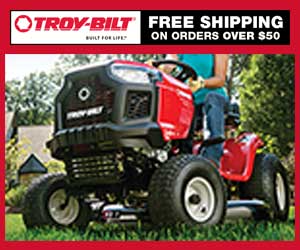Tack & Farm
Our Tack & Farm section features an Apparel section to find both practical and fashionable riding attire. If you ride English & Western or Race, many sources are available in the Tack section.
Building a barn? Need an architect for your equine dream home? Find one in Barns & Stalls.
Have a hungry horse? Of course you do! Find a place to buy your feed and tuck your horse in at night in the Bedding & Feed section. Looking for a place to keep your horse? You can find it in the Horse Boarding section. Keep your horse happy and beautiful with resources in our Grooming section.
Traveling? Find a Shipping company or Horse Sitting service if your horse is staying home!
Running and maintaining a farm or stable is a continuous effort, and to help find products or tools you need, please see our Equipment, Fencing and Management Tools sections.
Seeking Services? Find financial and tax expertise in our Accounting section. Companies who will help protect your investment are found in the Insurance section. For those who want legal advice about purchasing, liability, and other issues, please look at the Equine Law section to find an expert. Build and promote your business with teams from Marketing / Videography / Web Design.
Do we need to add more? Please use the useful feedback link and let us know!
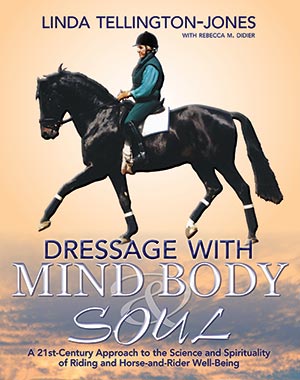
by Linda Tellington-Jones
Renowned animal behaviorist Linda Tellington-Jones shares her recommendation for making time spent grooming a horse a quality experience that builds toward better health and improved performance…for you both.
Step 1 Gather your grooming tools. Final choices will vary depending on your horse’s sensitivity, so to save time, first lay them all out together to allow you the opportunity to test different brushes and find those your horse likes best. With the very sensitive and hyperreactive dressage horse in mind, I like to have a soft rubber mitt or gentle curry (Grooma. products work well), a sheepskin mitt, brushes of different degrees of softness and bristle type, a hairbrush, a bucket of hot water, and some clean towels. In addition, a Tellington Wand can provide a good introduction to the process and help ground your horse before you begin (see Step 4).
Step 2 Take your horse’s pulse and respiration before you begin.
Step 3 The ultimate goal is for your horse to enjoy being groomed enough to stand quietly without being tied or cross-tied. Initially you may need someone to hold him, as this process is most effective if you can use both hands on your horse’s body.
Step 4 Start by stroking your horse with a Wand (or standard white dressage whip—horses seem to respond very differently to white rather than black) all over his body. Stroke firmly to avoid tickling the horse—there should be a slight “flex” to the Wand as you move it against his body. Pay attention to the rhythm and quality of your breathing. Note how your horse is standing during this process: Is he in balance over all four feet? Is he fidgeting? Watch his eyes, ears, and skin—how do they look as the Wand moves?
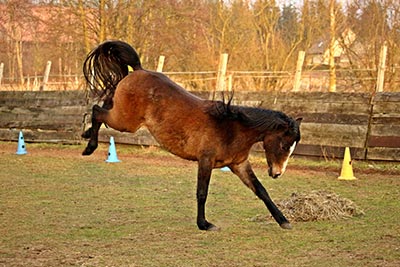
by Bonnie Marlewski-Probert
The good news is that spring is just around the corner. For those of you who never thought winter would end, it is ending soon and now is the time to start thinking about getting yourself, your barn and your horse ready.
This is the time of year when so many horse owners incorrectly assume the horse that they put up for the winter is going to be the same horse they pull out of its stall this spring - WRONG! In most cases, that horse has continued to be fed very well throughout the cold weather and in many cases, actually had an increase in the feeding program during the colder months while at the same time the exercise level dropped to near "couch potato!"
What many horse owners forget to recognize is that food is an energy producer, in the same way that putting a log onto a fire produces energy. When we continue to feed high protein feed (hay and grain products) but provide our horse with little or no exercise, we get the same result that we would get if we just kept throwing logs onto a fire, a hot burning inferno. What that means is that for many horse owners, you will be facing a very fresh animal during the first few sessions in the spring. So, what can you do about it? Plenty.
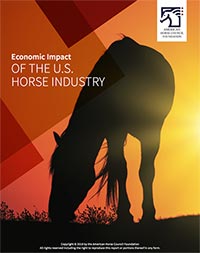
(Washington, DC) - While the equine industry as a whole generates approximately $122 billion in total economic value, it’s commonly thought that the “big three” that are the primary economic drivers: Recreation, Racing, and Competition. However, the American Horse Council Foundation (AHCF) felt it was also important to bring in a new sector of the industry’s economic impact: Working Horses.
“Traditional working horses remain an important part of the industry, and not just on American ranches,” said AHC President Julie Broadway. “In cities like New York and even here in Washington, DC, it’s not uncommon to have horses patrolling the streets, allowing individuals access to horses that they may not have otherwise had. Horses can also be found pulling carriages and adding charm to America’s cities and historic destinations.”
The Working Horse sector consists of equines used in segments such as mounted police units, carriage operations, equine assisted therapy programs, and lesson programs, which accounts for 8% of the equine population. The Working Horse sector supports more than 42,000 direct jobs and adds $1.9 billion in direct value to the U.S. economy. These direct impacts drive a further $2.7 billion in added value to the economy and create more than 28,000 jobs from indirect and induced effects.
The Recreation sector supports more than 162,000 direct jobs and adds $7.5 billion in direct value to the U.S. economy. Those direct impact drive a further $10.5 billion in added value to the economy, and create more than 110,00 jobs from both indirect and induced effects. Additionally, nearly 13 million households have participated in trail riding, with the vast majority of trail riders- 87%- utilizing public lands to ride on.
Read more: A Deeper Dive Into the AHCF’s 2017 Economic Impact Study
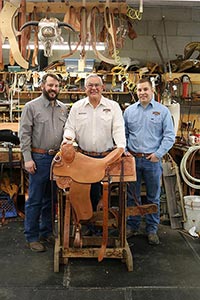
by Lynn Ascrizzi
Oliver Saddle Shop is the oldest, family-owned saddle maker in Texas.
In these modern times, you might think that the iconic, working cowboy is fast becoming a rare breed. But, longtime saddle maker Richard Oliver, who owns and operates the Oliver Saddle Shop in Amarillo, Texas, has his own take on the subject. He and his small team specialize in building saddles for the working cowboy.
“This is cow country, and there are a lot of cowboys. The population of working cowboys in our area is staying about the same. One of them may grow old and retire, but it seems like a new one is always replacing them,” he said. And, he tipped his wide-brimmed hat, figuratively speaking, to all the cowgirls who also put in a hard day’s work on the range.
He speculated that the romantic appeal of the cowboy life might also attract some newcomers. But as Oliver well knows, a real cowboy’s work is fraught with hardships, something he takes into consideration when building saddles.
“A lot of people don’t realize that a working cowboy leaves before daylight, rides all day, and gets home after dark. So, you don’t put them in a roping saddle. The roping saddle is an uncomfortable saddle to ride. Folks compete in those saddles in the arena. They’re flat seats — not made for riding long hours. You have to put him in a comfortable seat, so that all day long he can perform his duties. A lot of cowboys buy our equipment out of necessity, because they’re safer, more comfortable and better on the horse.”
Read more: Building Saddles for the Working Cowboy - Oliver Saddle Shop
- 7 Tips for Choosing the Right Equestrian Property
- Fenoglio Boot Company
- Lisa and Loren Skyhorse, Humanitarian Saddle Makers
- Don King: The Man in the Center
- Nettles Country: Stirrups for Every Foot
- For the Love of Fine Gloves
- Boobuddy Equestrian Fitness Accessory for Women (Video 0:43)
- Is it Time to Walk Your One True Love Down the Center Aisle?
- Mobile Apps
- Winter Preparation in the Barn






